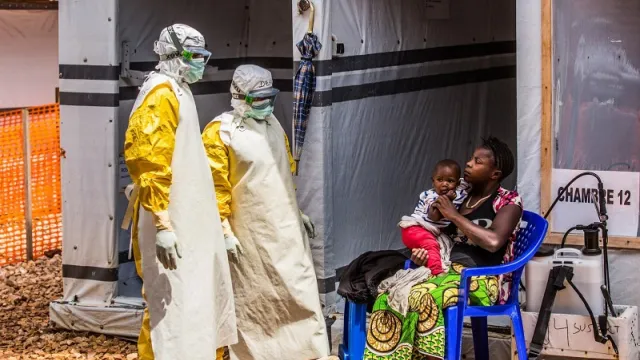Kenya should worry about the Ebola virus outbreak

Kenya should worry about the Ebola virus outbreak
The Ebola virus that first swept through the isolated forest village of Yambuku in Northern Zaire, continues to haunt health officials and economies all over the world, 43 years later.
But it is the latest outbreak this year that has captured the world’s attention, firmly. According to data released by the DRC government in August, there were more than 3,000 confirmed and probable cases and a death toll above 2,000.
Read also:
- Nations must act again to avert the deadly effects of climate change.
- How the 'grim reaper' is sweeping Kenya's heroes and heroines
However, despite efforts to contain the virus, much progress is yet to be made. What the affected nations like DRC, Uganda can hang on to is the knowledge about the symptoms and how the disease spreads, highly effective experimental treatments and vaccines.
In Goma-a city of 2 million people bordering Rwanda, two of the four patients who were diagnosed with the virus succumbed.
Many Ebola cases are unidentified, and health officials fear the epidemic could last up to 2-3 years if not contained. The major worry if not contained, the virus will eventually find its way beyond the DRC and possibly beyond Africa.
The West African Ebola epidemic from 2013 to 2016 still rings a bell among health officials. It was by far the deadliest, recording more than 11,300 deaths, out of 28,000 infections.
Is Kenya prepared to handle such an outbreak, should it occur? What would the country require in case of an Ebola epidemic?
During the 2014-2015 Ebola virus outbreak in West Africa, for example, community education was crucial to containing the spread of the virus.
To successfully address outbreaks all countries need strong public health surveillance systems, laboratories capable of diagnosing a broad range of pathogens, trained public health workforce and an Emergency Operations Center capable of coordinating the response.
“We hope with a unified public health response and the expanded use of the vaccine and new treatment regimen, this outbreak will be brought under control,” said Justin Williams, Senior Communications Specialist, Centers for Disease Control and Prevention-Kenya.
The country, adds Williams in a statement, has developed and is in the process of strengthening its ability to prevent, detect and respond to public health threats with support from the U.S government and other donors.
The level of preparedness that the country is demonstrating for Ebola Virus Disease (EVD) is commendable. The recent suspected case in Kericho town is a case in point.
But it is now obvious that science and public health alone will not contain Ebola amid widespread violence in the origin country and porous borders to boot! Properly functioning hospitals and clinics that build community trust is key.
In informal settlements where many people living in close proximity to each other, lack of access to safe water and poor sanitation, are significantly more exposed to potential disease outbreaks like the EVD.
It is therefore critical to repair the broken health care systems to enable people in poor communities and informal settlements receive proper treatment. Williams further confirms, “The ongoing epidemics of HIV, tuberculosis and malaria and the emerging threat of non-communicable diseases remain the principal threats to public health in Kenya.”
Worth noting is that Ebola is a communicable disease. So, to stop the outbreak, individuals need to be responsible and report to the nearest health facility if they develop any symptoms.
In DRC, although there is an effective vaccine and a new treatment regimen that is proving to save lives, the ongoing issue is that people who are sick in the heavily affected areas and their close contacts are not always seeking care early when they first identify with the symptoms.
In response, the Ministry of Health recently activated its Public Health Emergency Operations (PHEOC) with a toll-free public hotline 0800721316 to report any suspected cases. It is believed the unit will lead the coordination of any Government of Kenya response.
At major border crossings in Western Kenya and airports, the Port Health Unit has been conducting temperature screenings as part of the activation.
Until we address its root causes, ending the EVD outbreak will one day come back , albeit, with a deadly force.



